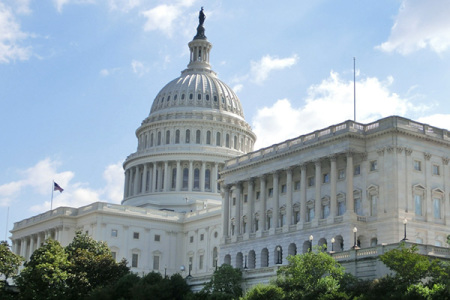Pro-life groups praise Senate for supporting Hyde Amendment banning taxpayer funding for abortion

Pro-life groups are praising the U.S. Senate for expressing support for the preservation of bans on taxpayer funding of abortion in the federal government’s budget for the upcoming fiscal year.
In a Tuesday “vote-a-rama” where senators voted on a variety of amendments to the proposed federal budget for fiscal year 2022, the Senate narrowly approved the Lankford Amendment, a non-binding resolution that sought to preserve longstanding bipartisan provisions banning the use of taxpayer dollars to pay for abortions and protecting the conscience rights of Americans who oppose abortion. The Lankford Amendment passed by a razor-thin margin of 50-49, with Sen. Joe Manchin, D-W.Va., joining all Senate Republicans in supporting the measure.
“While a majority of Americans oppose taxpayer funding for abortion on demand, most Senate Democrats have no problem ignoring their constituents to vote in lock-step with the abortion industry,” said Marjorie Dannenfelser, president of the pro-life group Susan B. Anthony List, in a statement. “We thank Senator Manchin for being the notable exception by standing up for unborn children, their mothers, and pro-life American taxpayers today.”
Carol Tobias, president of the pro-life group National Right to Life, thanked the “pro-life champions in the Senate for their tireless work to protect unborn children and their mothers.” According to Tobias, “Senate Democrats are targeting the longstanding popular Hyde Amendment at every turn. The goal is to ensure abortion on demand at any time and for any reason.”
In addition to expressing support for the Hyde Amendment, which bans the use of taxpayer funding for abortion, the Lankford Amendment also included the Weldon Amendment, another longstanding measure that prevents healthcare workers who oppose abortion from having to perform the procedure. While a majority of the Senate got behind the Lankford Amendment, other attempts to include pro-life measures in the budget for fiscal year 2022 did not succeed.
As noted by the National Right to Life, the Kennedy Amendment, which would “prohibit abortions after 20 weeks (consistent with the ‘Pain-Capable Unborn Child Protection Act’) was rejected in a vote of 48-51. While Manchin joined most of his colleagues on the other side of the aisle to support the Kennedy Amendment, Sens. Susan Collins, R-Maine, and Lisa Murkowski, R-Alaska, broke with their party by joining the remainder of Senate Democrats in opposing the measure.
Additionally, the Senate voted to reject the Inhofe Amendment, which would have protected unborn children with Down Syndrome from abortion. Collins and Manchin broke with their respective parties to oppose and support the measure, respectively.
After the votes concluded Wednesday, the Senate voted along party lines to advance the $3.5 trillion budget blueprint crafted by Sen. Bernie Sanders, I-Vt. All Democrats voted to approve the budget blueprint while all Republicans rejected it.
The vote to approve the Lankford Amendment as well as the $3.5 trillion budget blueprint as a whole follows the House’s passage of a budget that did not include the Hyde Amendment. Going forward, the two chambers will have to reconcile the differences between their respective budgets before a finalized spending bill can head to President Joe Biden’s desk for a signature.
As CBS News reported, “the budget resolution provides instructions to committees to draft legislation that can pass using a process known as reconciliation, which allows Democrats to pass the package with a simple majority.” In other words, the actual $3.5 trillion spending package still awaits congressional approval.
Manchin, who represents a state that overwhelmingly supports Republicans in presidential elections, indicated that he might not vote in favor of the final $3.5 trillion package in a statement Wednesday: “I have serious concerns about the grave consequences facing West Virginians and every American family if Congress decides to spend another $3.5 trillion.”
My statement raising concerns about the consequences of passing a .5 trillion budget: pic.twitter.com/gGsEXcVTxd
— Senator Joe Manchin (@Sen_JoeManchin) August 11, 2021
“Given the current state of the economic recovery, it is simply irresponsible to continue spending at levels more suited to respond to a Great Depression or Great Recession — not an economy that is on the verge of overheating,” he added. “I firmly believe that continuing to spend at irresponsible levels puts at risk our nation’s ability to respond to the unforeseen crises our country could face. I urge my colleagues to seriously consider this reality as this budget process unfolds in the coming weeks and months.”
Manchin’s potential opposition to the multi-trillion dollar spending package is significant because if Republicans remain united in opposition to the measure as expected, a “no” vote from the West Virginia senator could sink the effort to pass the progressive spending bill altogether in light of the Democrats’ narrow majority in the Senate.
Should the House and Senate fail to agree on the contents of a budget before midnight on Oct. 1, when fiscal year 2022 begins, a partial government shutdown will commence unless both chambers agree to a continuing resolution that will fund most of the federal government at existing levels for a limited period of time.
Ryan Foley is a reporter for The Christian Post. He can be reached at: ryan.foley@christianpost.com





















